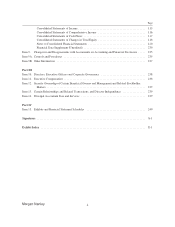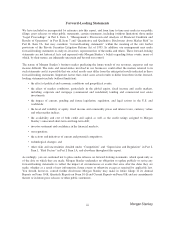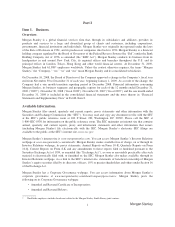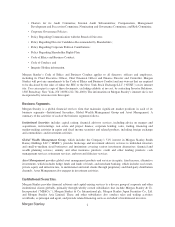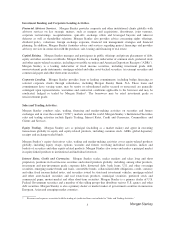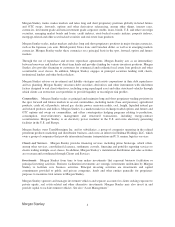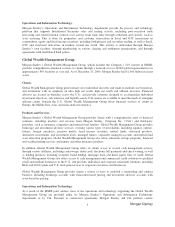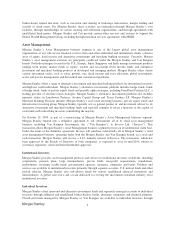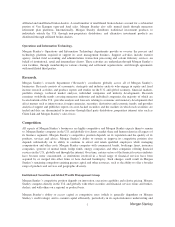Morgan Stanley 2009 Annual Report Download - page 13
Download and view the complete annual report
Please find page 13 of the 2009 Morgan Stanley annual report below. You can navigate through the pages in the report by either clicking on the pages listed below, or by using the keyword search tool below to find specific information within the annual report.
compensation in the financial services industry; enhancing corporate governance, especially regarding risk
management; and creating a new agency, the “Consumer Financial Protection Agency,” to protect U.S.
consumers who buy financial products.
Reforms are being discussed concurrently in Washington, London, the European Union (“EU”) and other major
market centers in which Morgan Stanley operates, and attempts are being made to internationally coordinate the
principles behind such changes through the G-20’s expanded mandate for the Financial Stability Board and
through the Basel Committee on Banking Supervision (“Basel Committee”), the International Association of
Securities Commissioners and others. Among the internationally coordinated reforms are recent measures and
proposals by the Basel Committee to raise the quality of capital, increase capital requirements for securitizations,
trading book exposure and counterparty credit risk exposure, and globally introduce a leverage ratio, capital
conservation measures and liquidity coverage requirements, among other measures. In both the EU and the U.S.,
moreover, changes to the institutional framework for financial regulation are being discussed or are underway.
Many of the market reforms, if enacted, may materially affect Morgan Stanley’s business, financial condition,
results of operations and cash flows for a particular future period. In particular, if systemic regulation were
enacted, Morgan Stanley would likely be designated as a systemically important firm, and the consequences of
systemic regulation, including a potential requirement for additional higher quality capital and liquidity and
decreased leverage, could materially impact Morgan Stanley’s business.
A substantial number of the financial reforms currently discussed in the U.S. and globally may become law,
though it is difficult to predict which will become law, how such reforms will be implemented or the exact
impact they will have on Morgan Stanley’s business, financial condition, results of operations and cash flows for
a particular future period. As most changes, if adopted, will require regulatory implementation, the full impact of
these changes will not be known until a later stage.
Financial Holding Company.
Since September 2008, Morgan Stanley has operated as a financial holding company under the BHC Act.
U.S. Banking Institutions. Morgan Stanley Bank, N.A. (“MSBNA”), primarily a wholesale commercial bank,
offers consumer lending and commercial lending services in addition to deposit products. As an FDIC-insured
national bank, MSBNA is subject to supervision and regulation by the Office of the Comptroller of the Currency
(“OCC”).
Morgan Stanley Trust is a wholly owned subsidiary that conducts, through a subsidiary, certain mortgage lending
activities primarily for customers of its affiliate retail broker Morgan Stanley Smith Barney LLC (“MSSB
LLC”). Morgan Stanley Trust also conducts certain transfer agency, sub-accounting and other activities. It is an
FDIC-insured federal savings bank whose activities are subject to comprehensive regulation and periodic
examination by the Office of Thrift Supervision.
Morgan Stanley Trust National Association, a wholly owned subsidiary, is a non-depository national bank whose
activities are limited to fiduciary and custody activities, primarily personal trust and prime brokerage custody
services. It is subject to comprehensive regulation and periodic examination by the OCC. Morgan Stanley Trust
National Association is not FDIC-insured.
Scope of Permitted Activities. As a financial holding company, Morgan Stanley is able to engage in any activity
that is financial in nature or incidental to a financial activity. Unless otherwise required by the Fed, Morgan Stanley
is permitted to commence any new financial activity, or acquire a company engaged in any financial activity, as
long as it provides after–the–fact notice of such new activity or investment to the Fed. Morgan Stanley must obtain
the prior approval of the Fed before acquiring more than five percent of any class of voting stock of a U.S.
depository institution or bank holding company or commencing any activity that is complementary to a financial
activity. Under some reform proposals, any non-banking acquisition of more than $25 billion in assets would
require prior Fed approval, and regulators would be given new means to limit activities.
9


